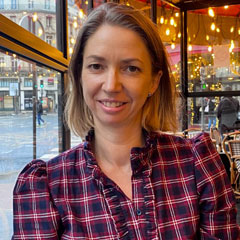Jane Richards, Lecturer in Law, York Law School and Fellow in the Centre of Criminology, The University of Hong Kong
Jane practiced as a solicitor in Australia before moving to Shanghai, and then onto Hong Kong where she did her LLM and PhD in human rights law.

At York, she is a lecturer in the law school, where her research and teaching focuses on the intersection of human rights and criminal law.
Our 60-second interview with Jane:
Could you please tell us what work you do in the field of mental health?
My PhD applied the UN Convention on the Rights of Persons with Disabilities (CRPD) to the insanity defence in criminal law. I am very interested in the protection of the rights of mentally disordered defendants, especially considered from a disability rights perspective. At the same time, these rights must be considered in the broader context of the criminal law, which takes into account the protection of the public from the risk of violence. My work explores the tensions between these somewhat disparate areas of law.
What do you find most rewarding and inspiring in this work?
I find the complexity of balancing competing rights intellectually stimulating. I am drawn to the ‘hard cases’ in human rights. Trying to find solutions to problems where there is no easy answer is what motivates me. I am also inspired by the insights of other scholars.
What is the most challenging or complicated aspect of this work?
Most people will have a gut reaction to the commission of egregious crimes, and the debates between the different camps of scholarship are highly emotive, polarising and often politically driven. These are not easy waters to navigate, but in prompting the discussion I hope to challenge preconceived notions about mental disability, especially within criminal law.
What impact do you hope your work is having - or can potentially have?
I hope that my work will bring reform to make the criminal justice system more inclusive of people with mental disabilities. In the spirit of the CRPD, I hope to break down harmful stereotypes to bring holistic change which strives for a more equal society.
Could you share with us one piece of advice that you follow for your own mental health?
Exercise and sleep! Perhaps this advice feels generic, but these are essential to me. I used to be a competitive runner, and before that, a triathlete. With three kids and a fulltime job, I don’t presently have the time or motivation to train more than once a day. And while I miss being really fit, I feel so lucky that I can lace up my running shoes and get outside for a run in the daylight nearly every day. This is especially important for me in England’s short, dark, cold days; even when the weather is atrocious, I feel so much better making the time for a workout. And I am certainly not someone who can get by with not enough sleep. I feel boring emphasising it, but getting enough sleep is essential for my mental health and productivity.